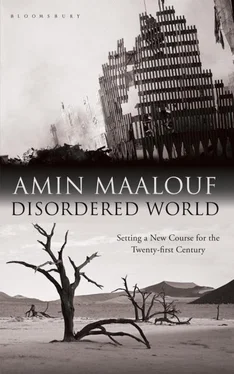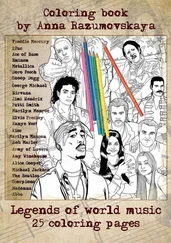The turning point came first in Libya. Demonstrations began in Benghazi on 15 February and rapidly spread throughout the country. Up until then, Colonel Muammar Gaddafi, who had been in power for almost forty-two years, seemed immoveable. So it was astonishing to see a scenario similar to those in Tunisia and Egypt beginning to be played out there, too. Of course, from its earliest days it was violently repressed, creating hundreds of victims, but the protests kept on growing and by the end of that week speculation had begun as to the likely destination for the exile of the soon-to-be-ousted dictator. There were persistent rumours that he was already on his way to Venezuela.
This was premature. At the critical point at which Ben Ali and Mubarak judged it futile to hang on and thought it better to go, Gaddafi dug his heels in. Of course, he was different from his neighbours in many ways — his personality, the structure of his regime, the topography of his country — but the most significant distinguishing feature at that crucial moment was linked to the nature of Libya’s armed forces. In both Tunisia and Egypt, the regular army had not wanted to fire on civilians, leaving that degrading task to the police and special forces; in Libya, the regular army carried little weight and the best-armed, most combat-hardened contingents reported directly to Gaddafi and his sons; he decided therefore to use them to the limit and turn all their fire power on the demonstrators. That allowed him to retake Tripoli and then launch a recovery operation throughout the country. Confronted with an organised military offensive, peaceful marching in the streets and public squares no longer made any sense. Protesters seized weapons they found in the barracks in their towns, thereby becoming insurgents. A civil war had begun that would soon lead to international intervention.
This escalation in the violence had repercussions elsewhere in the region, where several rulers felt that they could avoid being overthrown by clinging on to power, cracking down more severely, and ignoring the demands of their people and the condemnation of the international community. There were, of course, major differences between the Libyan situation and those of other countries such as Yemen, Bahrain and Syria, but it became clear from the first weeks of the year that peaceful protests would not be enough to bring down Arab regimes, and that they would fight fiercely — even savagely — to ensure their survival.
As I write this preface, the initial revolutionary wave seems to have run out of steam, and the pace of dramatic change, which was gathering momentum from week to week, or to be exact from one Friday to the next, now seems to stretch over months and even years. Where the movement has already won victories, it has quickly reached the difficult and thankless phase of reconstruction. New democratic institutions need to be established, economies restarted, social tensions managed — and all this in countries where the people’s expectations are huge and no leadership has emerged. This is because what constitutes the revolutionary movements’ strength — their spontaneity, the key role played by idealistic, imaginative and generally non-partisan young people — also constitutes their weakness. Those who fought on the internet, making good use of social networks and skilfully circumventing official censorship to put up videos showing the security forces’ brutality, succeeded as if by a miracle in sweeping away the regimes in power; but they were not able to transform themselves into governments or administrators. They had no option but to leave power in the hands of the military and experienced politicians who had distanced themselves — sometimes very late in the day — from the fallen despots, but who did not necessarily share the ideals of the rebellious young people. As a result, it is hardly surprising that the transition is turning out to be long, faltering, troubled and littered with pitfalls.
Will Egypt, the most populous Arab country and the one which in the past has often been their leader, especially at the time of Gamal Abdel Nasser, be able to assume political, economic and social leadership once more? Will it be able to construct a stable democracy, catch up in the field of education, define the place of religion in public life, manage relations between different communities, and give women full rights? And will Tunisia, which was the pioneer in the great uprising and which has always been at the vanguard of social modernity in the Arab world, be able to come up with an advanced model that will inspire other countries?
On this as on so many other scores, it would be presumptuous to make predictions. If there is a lesson to be drawn from the events of 2011, it is that the future does not allow itself to be contained within the limits of what is foreseeable, plausible or probable. And it is precisely for that reason that it contains hope.
While nations which have already freed themselves get down to the difficult task of transition, the struggle against dictatorial powers is proceeding at different speeds in the rest of the Middle East and North Africa. In some countries, leaders seem irredeemably weakened both domestically and internationally, and it is conceivable that when the protesters triumph, it will give the whole of the Arab uprising a new impetus. Because even if the resilience of regimes has been strengthened, the people’s determination has not been broken, despite bloody repression.
All the ingredients of the initial revolt are still present, apart from the element of surprise. The causes of unhappiness have not, of course, disappeared — quite the reverse. Fearful despots behave with more ferocity than ever, thereby losing what little legitimacy they had retained in the eyes of their subjects, who now regard them more as foreign occupiers than as national leaders. And any moves towards reform on the part of most of these regimes remain timid, often no more than vague promises intended to calm the protesters’ passion while waiting for the storm to pass so that business as usual can be resumed.
And yet, in people’s minds, a great deal has changed, though those in power often fail to realise how profoundly. All Arab societies have shown a deep desire to live with dignity and a remarkable determination to fight to achieve it. It has often been said during this turbulent period that the Arabs have put an end to the myth which suggests they are less hungry for freedom than other peoples and less keen to live in representative democracies. This myth has effectively collapsed, but what has happened goes much further than that. The Arabs have not just caught up; they have not simply joined the group of democratic peoples: they have gone much further. 2011 will not just go down in history as the Arab equivalent of 1989 in Central and Eastern Europe. At no point in recent history — not even at the fall of the Berlin Wall — have we seen tens of millions of people brave death, baring their chests to bullets, and growing neither tired nor discouraged, as we have seen in Taez, Zawiya, Manama or Homs, day after day, week after week. Nowhere in the world have we seen such heroism. It is an exceptional, unprecedented phenomenon, and perhaps the harbinger of a democratic renewal worldwide.
The German poet Hölderlin said: ‘Where there is danger, some salvation grows there too.’ The great uprising of the Arab people bears out his words. For my part, I would add: it is from those places where the world has been most disordered that in the next few decades the readjustment could come. So that a planet which is more peaceful, harmonious and human might be born, and therefore one which is more capable of facing the common dangers that lie ahead.
Amin Maalouf
Paris, 31 May 2011
Читать дальше












